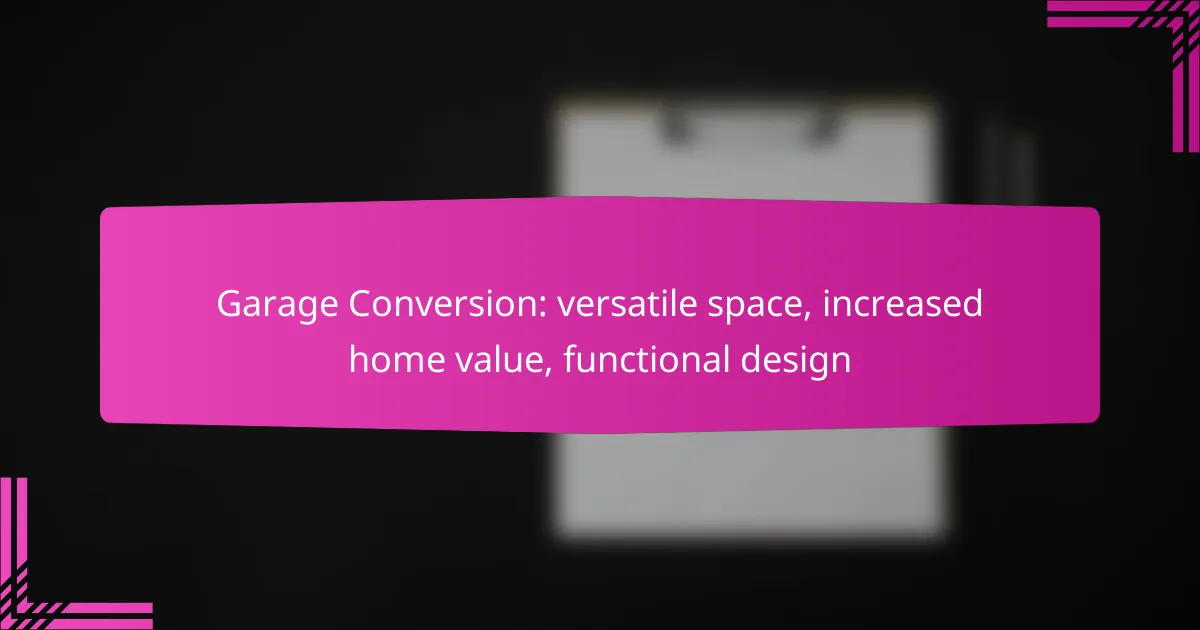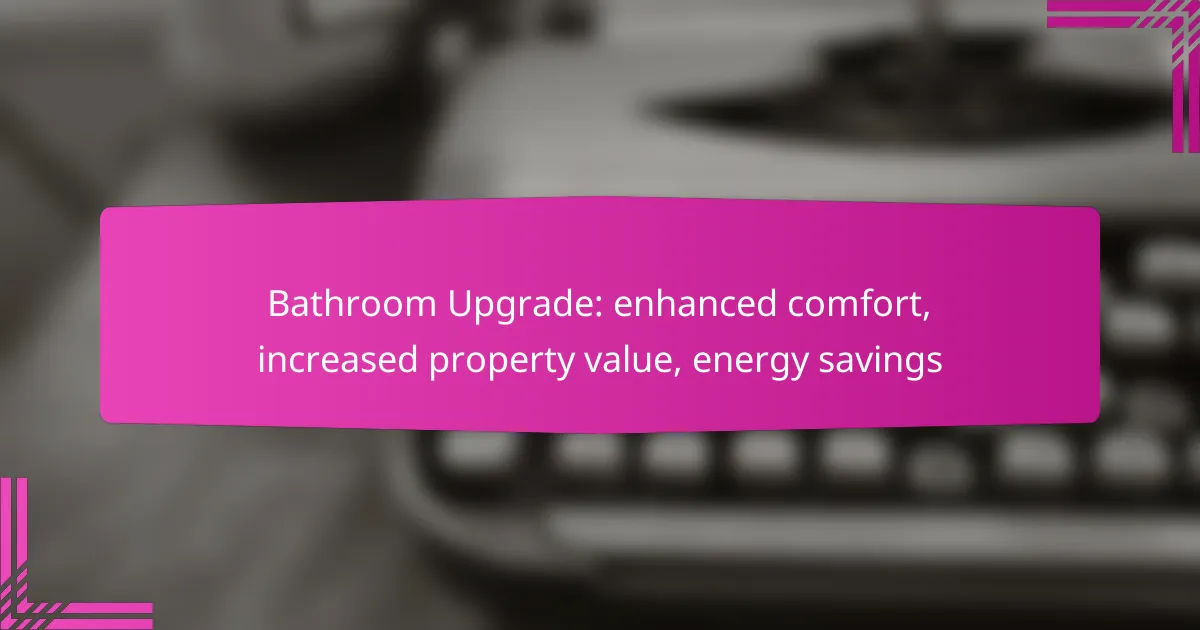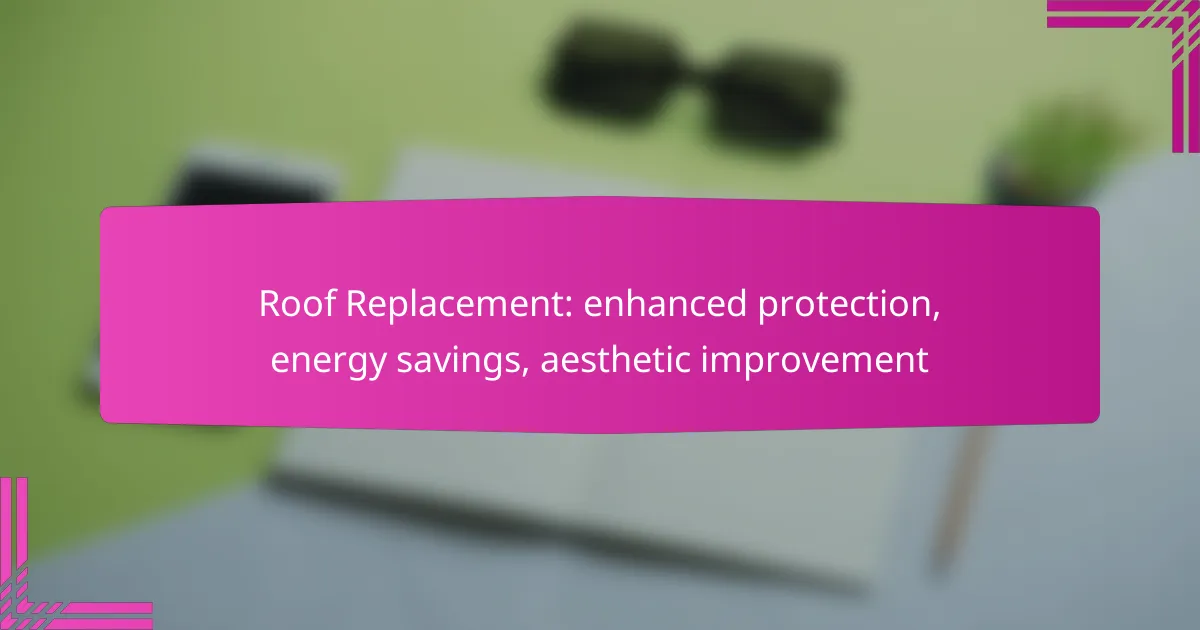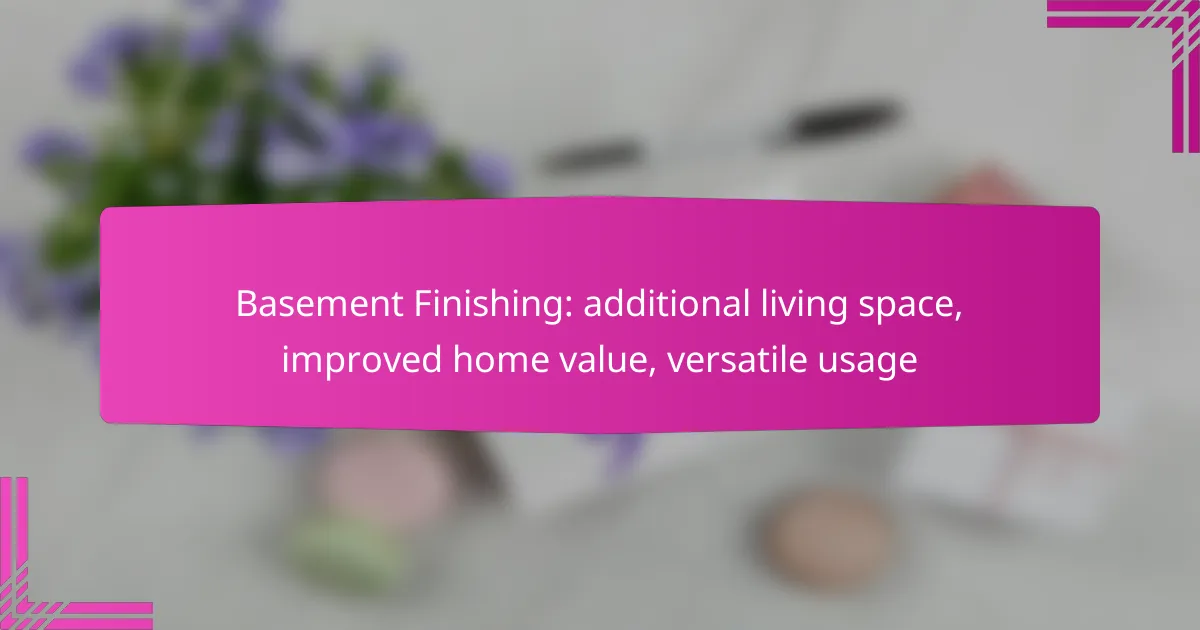A garage conversion offers a unique opportunity to enhance your home’s value by turning an underutilized area into a versatile living space. By focusing on functional design and maximizing comfort, you can create an appealing environment that integrates seamlessly with your home, making it more attractive to potential buyers.
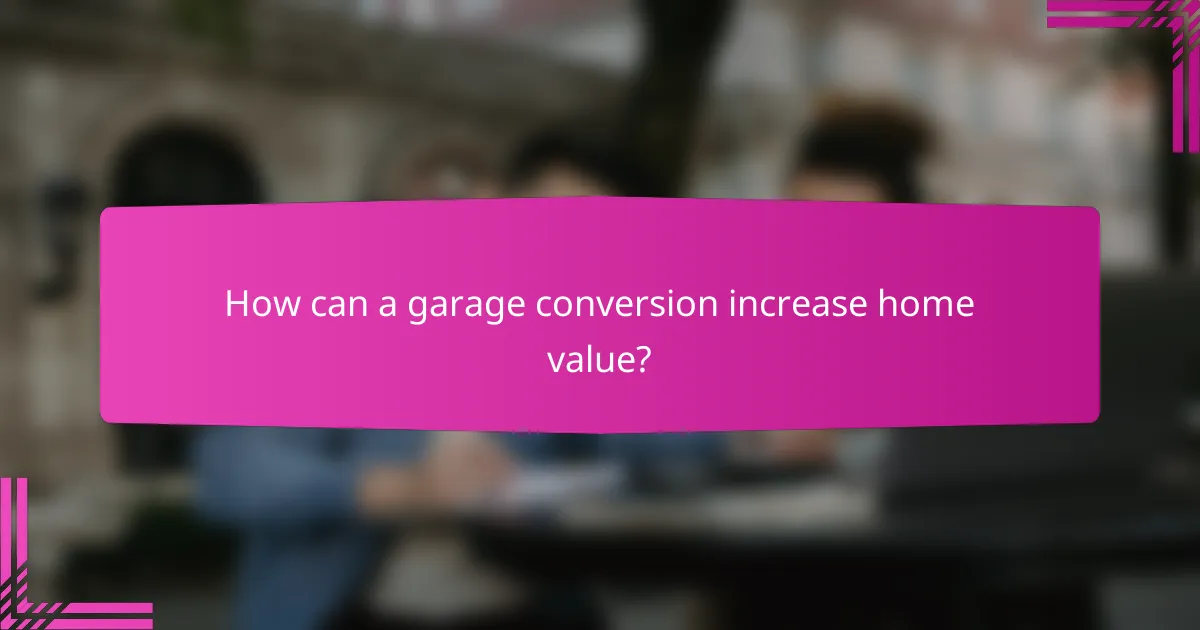
How can a garage conversion increase home value?
A garage conversion can significantly boost your home’s value by transforming unused space into functional living areas. This improvement not only enhances the property’s appeal but also increases its marketability to potential buyers.
Enhanced property appeal
A well-executed garage conversion can make your home more attractive to buyers by showcasing additional living space. Features such as a home office, gym, or guest suite can appeal to a wider audience, especially in urban areas where space is at a premium.
Consider using high-quality materials and finishes to elevate the overall aesthetic. A visually appealing conversion can lead to a quicker sale and potentially higher offers, making it a worthwhile investment.
Increased square footage
Converting a garage effectively adds square footage to your home, which is a key factor in determining property value. Depending on your local market, this additional space can increase your home’s value by a significant percentage.
When planning your conversion, ensure that the new space is functional and well-integrated with the rest of the home. This may involve proper insulation, heating, and ventilation to create a comfortable environment.
Potential rental income
A garage conversion can provide an opportunity for additional income through rental options, such as a separate living unit or Airbnb space. This can be particularly beneficial in areas with high demand for short-term rentals.
Before proceeding, check local regulations regarding rental properties to ensure compliance. Setting a competitive rental price based on similar listings in your area can maximize your return on investment.

What are the best design ideas for garage conversions?
Transforming a garage into a functional space can enhance your home’s value and utility. Key design ideas focus on maximizing space, ensuring comfort, and integrating the new area with the rest of your home.
Home office design
Creating a home office in your garage can provide a quiet, dedicated workspace. Consider adding soundproofing materials and adequate lighting to enhance productivity. A layout that includes a desk, ergonomic chair, and shelving for organization can make the space both functional and inviting.
Incorporate technology by ensuring sufficient electrical outlets and high-speed internet access. Personalize the office with decor that reflects your style, making it a pleasant environment to work in.
Guest suite layout
A garage conversion into a guest suite can offer privacy and comfort for visitors. Start by ensuring proper insulation and ventilation to maintain a cozy atmosphere. A queen-sized bed, bedside tables, and a small seating area can create a welcoming space.
Consider adding an en-suite bathroom or at least a half-bath to enhance convenience. Use light colors and mirrors to make the room feel larger, and include storage solutions for guests’ belongings.
Fitness room setup
Transforming your garage into a fitness room can promote a healthier lifestyle. Evaluate the space for adequate flooring, such as rubber mats, to protect the surface and provide comfort during workouts. Include essential equipment like weights, a yoga mat, and a cardio machine.
Ensure proper ventilation and lighting to create an energizing environment. You might also consider installing mirrors to help with form and motivation, and a sound system for an enjoyable workout experience.

What permits are required for garage conversions in the US?
Garage conversions in the US typically require various permits to ensure compliance with local building codes and regulations. These permits may include building permits, zoning approvals, and adherence to homeowner association guidelines.
Building permits
Building permits are essential for any structural changes to a garage. These permits ensure that the conversion meets safety standards and local building codes. Homeowners should consult their local building department to understand specific requirements, which can vary significantly by state and municipality.
When applying for a building permit, be prepared to submit detailed plans of the proposed conversion, including electrical and plumbing layouts if applicable. The cost of building permits can range from a few hundred to several thousand dollars, depending on the scope of the project.
Zoning approvals
Zoning approvals are necessary to confirm that the garage conversion complies with local zoning laws. These laws dictate how properties can be used, including restrictions on residential versus commercial use. Homeowners should check with their local zoning office to determine if their property is in a zone that allows for such conversions.
In some areas, zoning regulations may require a variance if the conversion does not meet specific criteria, such as setbacks or parking requirements. This process can add time and complexity to the project, so it’s wise to factor this into your planning.
Homeowner association guidelines
If your property is part of a homeowner association (HOA), you must adhere to its guidelines regarding garage conversions. HOAs often have strict rules about exterior changes, which can include the appearance of converted garages. Review your HOA’s covenants, conditions, and restrictions (CC&Rs) before proceeding.
Obtaining approval from the HOA may require submitting plans and attending a meeting. Failure to comply with HOA guidelines can result in fines or the requirement to revert the changes, so ensure you have all necessary approvals before starting your project.

What are the costs associated with garage conversions?
The costs of garage conversions can vary significantly based on factors like location, design, and materials. Homeowners should expect to invest a few thousand to tens of thousands of dollars to transform their garage into a functional living space.
Average renovation costs
On average, garage conversions can range from around $5,000 to $25,000, depending on the complexity of the project. Basic conversions that involve minimal structural changes tend to be on the lower end of this spectrum, while more elaborate designs with plumbing or electrical work can push costs higher.
In urban areas, costs may be elevated due to higher labor rates and stricter building codes. It’s essential to obtain multiple quotes from contractors to ensure a competitive price for your specific project.
Cost-saving tips
To save on costs during a garage conversion, consider doing some of the work yourself, such as painting or installing flooring. This can significantly reduce labor expenses. Additionally, sourcing materials from local suppliers or using reclaimed materials can help lower overall costs.
Another effective strategy is to plan your design carefully to avoid costly changes during construction. Sticking to a simple layout and minimizing structural alterations can keep expenses manageable.
Financing options
Homeowners looking to finance their garage conversion have several options available. Personal loans can provide quick access to funds, while home equity loans or lines of credit may offer lower interest rates by leveraging the equity in your home.
Additionally, some local governments or organizations may offer grants or incentives for home improvements that increase energy efficiency or provide additional living space. Researching these opportunities can help offset costs and make the project more affordable.

What are the common challenges in garage conversions?
Garage conversions often face challenges such as space limitations and compliance with building codes. Addressing these issues is crucial for a successful transformation into a functional living area.
Space limitations
Space limitations are a primary concern in garage conversions, as garages typically have less square footage than standard rooms. This can restrict layout options and furniture placement, making it essential to plan efficiently.
To maximize the available area, consider multifunctional furniture and open layouts. For instance, using a fold-out desk or a Murphy bed can help create a versatile space without overcrowding.
Building codes compliance
Building codes compliance is another significant challenge when converting a garage. Local regulations often dictate structural changes, electrical installations, and ventilation requirements, which must be adhered to for safety and legality.
Before starting your project, check with local authorities to understand the specific codes that apply. This may include obtaining permits and ensuring that the conversion meets minimum standards for insulation, fire safety, and accessibility.
